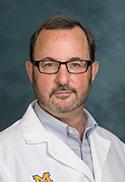Rogel researchers awarded $3.7M to address genetic testing among families
Media contact: Nicole Fawcett, 734-764-2220 | Patients may contact Cancer AnswerLine, 800-865-1125
But while the patient is supported through the genetic testing process, there’s no mechanism to cascade the findings throughout families and help those who may be affected to receive genetic testing or counseling.
A new $3.7 million grant, as part of the Beau Biden Cancer Moonshot Initiative, will support a clinical trial designed to test a personalized family genetic risk navigation support platform. The trial will be extended to all first- and second-degree relatives of 900 patients in Georgia and California in whom genetic testing identified a variant indicating an elevated hereditary cancer risk.
“This study has enormous potential to improve cancer prevention and early detection in families at high risk of hereditary cancer syndromes. Targeting genetic risk evaluation in families where a cancer susceptibility gene has been identified may be the most cost-effective approach to reduce the burden of cancer through prevention,” says principal investigator Steven J. Katz, M.D., MPH, co-leader of the health behavior and outcomes program at the University of Michigan Rogel Cancer Center.
The study team will develop and evaluate the Family Genetic Health Program, a technology assisted, personally tailored education and communication tool to facilitate genetic risk evaluation and management between patients and their relatives. The team will compare outcomes of the program with and without direct assistance from a personal genetic navigator. The trial will also assess various cost levels to understand the best price point.
In addition to Katz, the principal investigators are Allison W. Kurian, M.D., M.S., of Stanford University and Lawrence An, M.D., of the Rogel Cancer Center.
The study leverages a unique project led by Katz and Kurian, The Georgia California Genetic Testing Linkage Initiative, which has partnered with National Cancer Institute Surveillance, Epidemiology and End Results regional registries, commercial genetic testing companies and academics to link genetic testing results to all patients diagnosed with cancer in the two states over six years.
Grant citation: National Cancer Institute grant U01 CA254822-01

